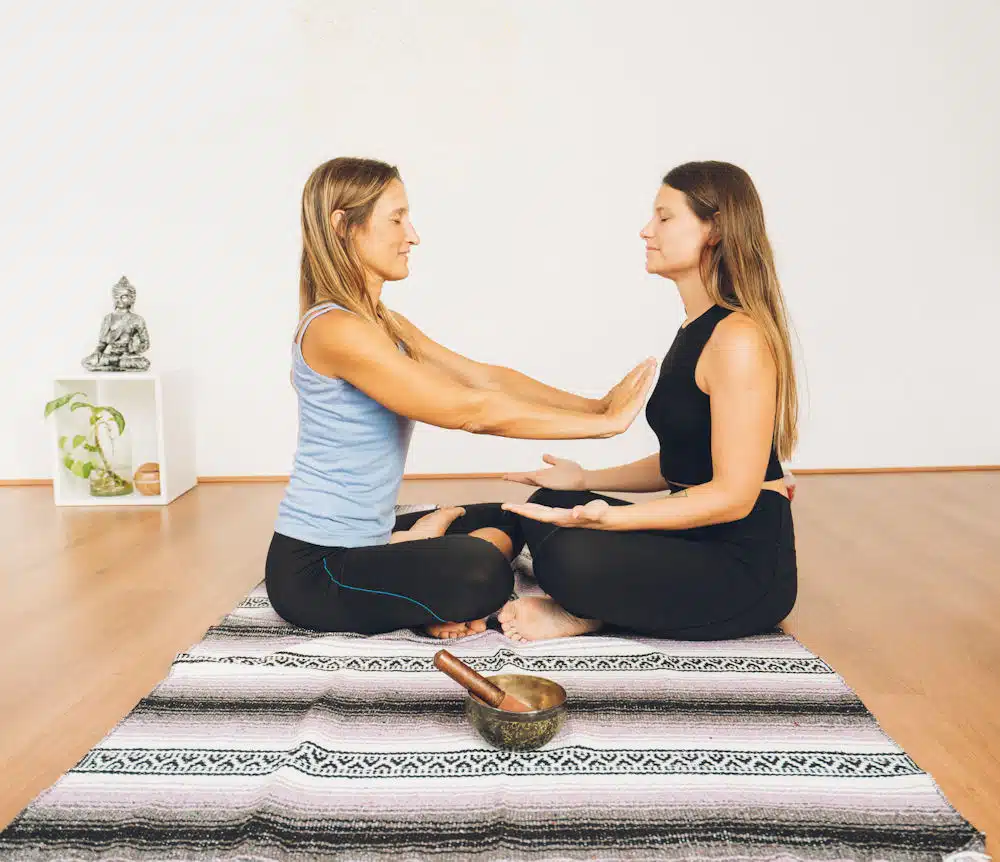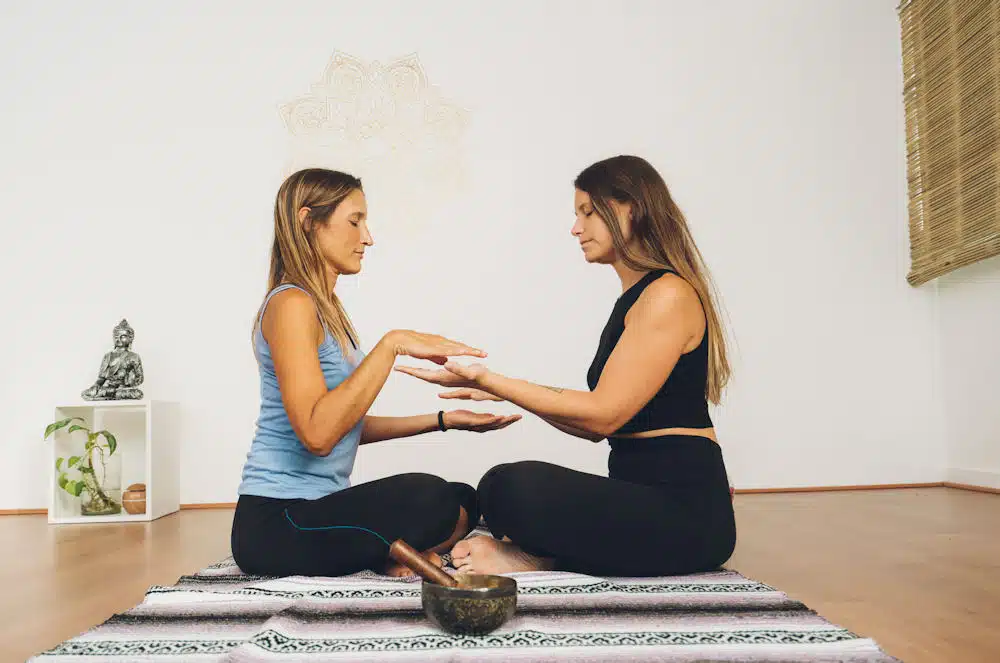
Villa Kali Ma offers a Japanese healing practice called reiki in our outpatient and inpatient settings. We integrate reiki as a supplemental holistic modality in recognition of its benefits in promoting energetic balance. Reiki supports and enhances treatment and recovery work.
What is Reiki?
Reiki, also called Reiki Healing Touch, is a healing technique that restores and promotes a state of health in the body, mind, and spirit, by stimulating the correct flow of ki, or vital force, throughout the body.
Reiki came to the West by way of Japan, where it was originally formulated into a simple, effective healing modality about a century ago.
The word reiki joins two Japanese words together, rei and ki. Rei is the indwelling God-essence found in all living beings, and Ki is the vital force. Ki is the Japanese version of the same concept in the Chinese language, qi.
Reiki restores health through the placing of hands on or near the body to affect the human electromagnetic field. The goal is to restore balance and flow of the body’s natural life force energy so that it is freed up to self-correct any trouble areas.
How does reiki work?

According to the medical paradigm that gives rise to Reiki, there is a vital life force, called Ki in Japanese. This force underlies, perfuses, and supports all life. When Ki is flowing as it should, it is like a pristine river in the wild. It has a way of flowing that works best to support all the life within it.
When this river of life force is polluted, blocked, or constricted in some way or another, the life force is likely to stagnate and create areas of by-water. These places are disconnected from the overall flow. In extreme cases, the river may lose its ability to support life at all.
According to Reiki and most other medical traditions arising from ancient healing practices, our physical, emotional, and mental health all depend on our vital life force being allowed to flow freely as the life within us directs us to, without undue constrictions imposed upon it.
We are resilient and can survive a lot of restrictions to our flow, such as those created through trauma, poor diet, and other ways of creating blockages, but in genera, it is not preferred by the body itself and has a cost in terms of our health.
Reiki’s healing effects may be due to its operation on the parasympathetic nervous system, the “rest and digest” side of the nervous system which down-regulates us, bringing relief from tension and anxiety, lowering blood pressure, deepening breathing, and slowing heart rate. This is the vagal state that most supports physical wound healing, digestion, release of shock from the nervous system, and recovery from psychological traumatization.
Are there any side effects of reiki?
Reiki is considered a gentle and safe way to encourage balance and health in the body. Reiki has no side effects.
Reiki is non-invasive, and gentle, and is used in hospitals, palliative care, and surgery rooms for its calming effects, without adverse effects.
What should you expect in a Reiki session?
Reiki sessions last around 45 to 90 minutes. There is no predetermined best number of Reiki sessions. Starting with a minimum of three sessions is usually advised, to get used to the effect Reiki has on you, and to notice its subtle beneficial impacts on your state of body and mind. Enduring health conditions would require more sessions, over time, as the body is tuned back to health incrementally, with subtle, non-invasive adjustments that won’t upset the body’s homeostasis.
During your Reiki session, you will lie down, though shorter seated sessions are also sometimes given. You remain fully clothed. The practitioner places their hands on or just above your physical body, depending on what you are comfortable with. The practitioner will move through 12 different established energy centers around your head and along your 7 chakras, which are the main energy centers along your spine.
Reiki can also be learned and self-administered relatively easily.
How does a Reiki session feel?
People usually report feelings of peace, deep relaxation, physical warmth, and calm during and after receiving Reiki. Some people experience tingling, coolness, or even no sensation during the treatment. Reiki is working with a subtle layer of the body’s energies and will not likely be an intense or dramatic sensation, though occasionally stronger energy movements and shifts inside the body may be sensed during or after sessions.
What are the Reiki healing benefits?

- Pain reduction and improved pain management
- Relaxation
- Stress reduction, amelioration of stress-related illnesses
- Parasympathetic nervous system activation, balancing of hyperarousal and hyperarousal systems
- Slowing of heart rate, reduction of blood pressure
- Improvements in anxiety and depression
- Better quality of life with chronic health conditions
- Enhanced feelings of self-esteem and overall well-being
- Symptom management with serious conditions like cancer
- Better sense of interpersonal connection and social belonging
What does the research say about reiki?
Some clinical studies have been conducted to verify the benefits of Reiki, comparing them to a placebo Reiki or “sham Reiki”. These studies aimed to find out to what extent subjective patient reports of being helped by Reiki can be substantiated with objective measures as well.
Studies until now suggest that Reiki may be helpful with pain relief, relaxation, and anxiety. A 2017 study comparing Reiki to placebo found promise in the use of Reiki for these domains.
A 2011 study of Reiki to support healthcare professionals avoid burnout suggested that Reiki demonstrated beneficial effects due to its action on the parasympathetic nervous system.
A similar conclusion was reached by the findings of a 2015 study into using Reiki to support clinicians working in mental health.
How much does Reiki cost?
In private practice, the cost of Reiki will vary by practitioner and may cost around $60-$90. Low-cost and even free Reiki sessions are sometimes available in certain contexts, where volunteer practitioners are offering their services. Reiki practitioners should have some training (there are three levels to become a master) and qualifications.
At Villa Kali Ma, Reiki sessions will be part of your treatment if you would like them to be.
Does insurance cover reiki?
As an alternative health modality, Reiki is not usually covered by health insurance. However, in some cases where physical therapy, massage, or palliative care are covered by an insurance plan, Reiki may be an option as well, so the best way to know is to check with your insurance.
Who should avoid Reiki?
There are no known reasons to avoid Reiki, as it is safe and non-invasive. Its main effects will be to stimulate your body’s self-healing systems by way of accessing the parasympathetic portion of the nervous system (the part responsible for rest, digestion, wound healing, and recovery from illness).
Please consult your trusted source of medical advice personally if you would like to know if there is any reason you personally should not get Reiki.
Villa Kali Ma offers Reiki for women

We find Reiki to be a valuable support through its mechanism of restoring peace and calm and triggering the self-healing side of the nervous system.
Villa Kali Ma’s holistic treatment program is available in our residential setting and our outpatient, community-based programs too. Depending on the level of care you need, you can receive Reiki as a part of your treatment journey with us.
The way we offer Reiki is as a supportive, adjunct therapy tailored specifically towards recovery-based goals of greater freedom, happiness, and peace.

